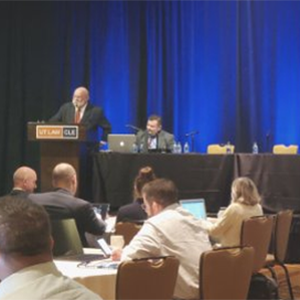
eCourse
2024 Hot Topics in Consumer Bankruptcy: Selling Avoidance Actions; Difficult Valuations; Modular Bankruptcy, and more
Contains material from Jan 2025
Technical Questions?
512.475.6700
service@utcle.org
- System Test
-
$155 Add to Cart
Session 02: Difficult Valuations: How to Determine Value on Complex Assets? - What happens when you encounter an unusual asset in a consumer case? How do you value partial interests, rights under community property laws, future interests, cryptocurrency, LLCs and other closely held businesses and other complex assets?
Session 03: Who Appreciates the Increased Value of the Assets More, the Chapter 13 Debtor or a Chapter 7 Trustee After Conversion? - Learn about the nuance of who gets the appreciated value of assets when a chapter 13 case converts to chapter 7. Does the benefit inure to the debtor or should the appreciation be made available to the creditors? Is the code clear, or are we just arguing equity?
Session 04: Modular Bankruptcy - A Consumer Scheme of Arrangement - The scheme of arrangement has been the premiere method of UK restructuring for some time now and has been drawing many U.S. firms to take advantage of its intentionally modular approach where some, but not all, of the debt is restructured. Could the same modularity be imported into the consumer realm? Yes, but not without resolving some serious complexities.
Includes: Video Audio Paper Slides
- Total Credit Hours:
- 3.00 | 0.25 ethics
- Credit Info
- TX, CA, PA
- TX MCLE credit expires: 2/28/2026
Preview Sessions
Show session details
Allison D. Byman, An Nguyen
Download session materials for offline use
Session 1 —45 mins 0.75
Brief Refresher/Update on Selling Avoidance Actions (Jan 2025)
A review of the Fifth Circuit’s opinion in Matter of South Coast Supply Co.—holding that avoidance actions are property of the bankruptcy estate and can be sold—and a discussion of the various issues addressed and others left unanswered.
Originally presented: Nov 2024 Bankruptcy Conference
Allison D. Byman,
Byman & Associates PLLC - Pearland, TX
An Nguyen,
U.S. Bankruptcy Court, Western District of Texas - Austin, TX
Show session details
Catherine Stone Curtis, Stephen W. Sather
Download session materials for offline use
Session 2 —44 mins 0.75
Difficult Valuations: How to Determine Value on Complex Assets? (Jan 2025)
What happens when you encounter an unusual asset in a consumer case? How do you value partial interests, rights under community property laws, future interests, cryptocurrency, LLCs and other closely held businesses and other complex assets?
Originally presented: Nov 2024 Bankruptcy Conference
Catherine Stone Curtis,
McGinnis Lochridge - McAllen, TX
Stephen W. Sather,
Barron & Newburger, P.C. - Austin, TX
Show session details
Todd Headden, Andrew Bates, Emily Chang
Download session materials for offline use
Session 3 —45 mins 0.75 | 0.25 ethics
Who Appreciates the Increased Value of the Assets More, the Chapter 13 Debtor or a Chapter 7 Trustee After Conversion? (Jan 2025)
Discuss the nuance of who gets the appreciated value of assets when a chapter 13 case converts to chapter 7. Does the benefit inure to the debtor or should the appreciation be made available to the creditors? Is the code clear, or are we just arguing equity?
Originally presented: Nov 2024 Bankruptcy Conference
Todd Headden,
Hayward PLLC - Austin, TX
Andrew Bates,
Willkie Farr & Gallagher LLP - New York, NY
Emily Chang,
Law Clerk, U.S. Bankruptcy Court, Northern District of Texas - Dallas, TX
Show session details
John Pottow
Download session materials for offline use
Session 4 —39 mins 0.75
Modular Bankruptcy - A Consumer Scheme of Arrangement (Jan 2025)
The scheme of arrangement has been the premiere method of UK restructuring for some time now and has been drawing many U.S. firms to take advantage of its intentionally modular approach where some, but not all, of the debt is restructured. Could the same modularity be imported into the consumer realm? Yes, but not without resolving some serious complexities.
Originally presented: Nov 2024 Bankruptcy Conference
John Pottow,
University of Michigan Law School - Ann Arbor, MI